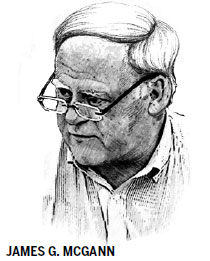Factual studies can help think tanks
James G. McGann, director of Think Tanks and Civil Society Program at the University of Pennsylvania, heads the team that prepares a report on global think tanks every year. Since 2006, when the yearly process started, the ranking in the report has been taken as an important reference point for the think tanks' quality and influence. In an interview with Li Yang at the Center for China and Globalization, a think tank in Beijing, McGann tells China Daily the opportunities and challenges for Chinese think tanks as they try to go global.
Q: How can Chinese think tanks become globally influential?
A: They should embrace innovation and institutional diversity. China has nothing to fear from a larger, more diverse set of think tanks, including the truly independent think tanks ... The rewards and nature of bureaucracy-based think tanks is that there's no incentive institutionally (or) organizationally, as suggested by Max Weber, for innovation and organizational renewal ... Chinese think tanks need to recruit staff with new skills and new ideas, and create a national network of think tanks in China that encourages innovation and exchange of these practices.
Q: Is the booming of think tanks in China today real or simply a response to President Xi Jinping's call?
A: The frequency of Xi mentioning the role of think tanks could mean, "I need ideas and I need them fast" ... China's think tanks are not diversified enough, and not changing and coming up with innovative ideas. The unique part in history is that China doesn't have the luxury of time, because all these issues, just look out of the window (the smog), are pressing the media.
Q: Could you give some examples of the failure of some famous Western think tanks, as we learn more from failure than success?
A: Coming late to the game, China has the ability to essentially focus on all the positive features and essentially not make the same mistakes that other countries and think tanks have made. Choosing a director based on ... the skills that are required to innovate and lead a think tank is key. The world is riddled with failed think tanks that simply didn't do this.
Q: The 1980s were boom time for Chinese think tanks. Compared with the 1980s, do you think Chinese think tanks today have more room for development?

A: It is a delicate balance of having innovation and growth while ... wanting to control. I understand the reality of the challenge that is presented by time constraint and issue constraint. How do you manage the fear of chaos from the urgent specific threat of real problems that don't have long fields ... More pressure comes from rapidly decreasing resources. You have to come up with innovative ideas. And the challenge is how you manage that time constraint and also the fear of chaos in the political world ... People whisper it, but people don't talk about it and everybody knows that that's the issue ... You need the comfort level to be able to essentially talk about ideas and solutions more importantly.
Q: How can the Chinese government be more helpful and effective in supporting think tanks?
A: There's no access to data in China. You have to be able to replicate (I teach research method) research. No one is ever going to trust or ... respect Chinese think tanks internationally unless and until there's an adherence to scientific method and access today ... These are things that are going to make it impossible for Chinese think tanks and research to have a global impact.
Q: Is it possible for famous think tanks to build a platform in the future to serve not only individual countries but also the entire world in response to global challenges such as climate change?
A: My interest is (to have) this global networking of think tanks. The agenda at the meetings of think tanks I'm organizing are looking at policy issues by their very nature that are at regional and global levels ... What I am designing is a transnational, trans-political and trans-disciplinary (network) ... We do not focus on enough inter-disciplinary research now. The major problem for think tanks is the tyranny of academic disciplines. The reality is that the problems we face today and precisely what you identified cannot be understood by a single discipline. The first thing would be to provide the funding and to bring together and create truly inter-disciplinary links.
Ge Kai contributed this story.
Contact the writer at liyang@chinadaily.com.cn.
























